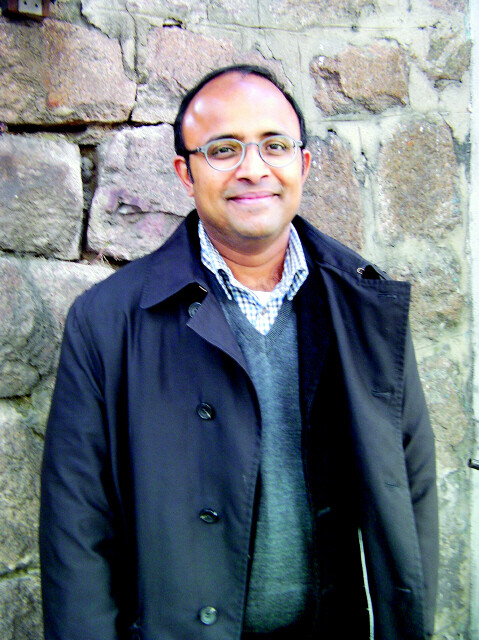hankyoreh
Links to other country sites 다른 나라 사이트 링크
S.Korea receives unfavorable human rights assessment

By Kim Min-kyoung
Amnesty International Asia-Pacific region researcher Rajiv Narayan gave an alarming analysis of the human rights situation in South Korea following a month-long study.
“Compared to three years ago, the freedoms not only of assembly and expression, but in civil society as a whole have been greatly curtailed,” he said.
Narayan, 44, covers the Asia-Pacific region that includes South Korea, North Korea, Japan, and Mongolia. He has been on a two-month visit to South Korea that began in October. Familiar with the country’s human rights situation from his work as South Korea investigator from 1999 to 2007, Narayan expressed his concerns about recent developments in South Korea during an interview with a Hankyoreh journalist Tuesday.
Narayan noted that due to the upcoming G-20 Summit, police questioning of homeless people and crackdowns on migrant workers have escalated, and certain international visitors to South Korea in connection with the G-20 have been denied entry or had visa issuance requests rejected.
“National security is an important issue, but the South Korean government, in the name of national security, is suppressing and discriminating against the socially disadvantaged and those who voice critical opinions to the government,” Narayan said.
On the recent situation with the National Human Rights Commission of Korea, where two of three standing commissioners have stepped down and many civic organizations and legal scholars are calling for the chairperson’s resignation, Narayan said, “The initial fears have become reality.”
In 2002, Amnesty International noted that the structure in which the president appoints the NHRCK chairperson could compromise the commission’s independence. Since the Lee Myung-bak administration came to office, Amnesty International has expressed opposition to bills for reducing the commission’s scope and moves to turn it into an organization under the authority of the president.
“The more the government tries to control the NHRCK, the more independence and influence, the core of the commission, are compromised,” Narayan said. “There needs to be fundamental changes to the NHRCK system so that it can independently handle its own committee member selection, budget, and other matters.”
Narayan also noted the recent push by the ruling Grand National Party to amend the Assembly and Demonstration Act to ban nighttime outdoor assemblies, despite a Constitutional Court ruling finding this unconstitutional, and the attempt by police to introduce equipment of unverified safety to suppress demonstrations, including sound cannons.
“Right now, everyone in the international community is worried about South Korea, which was once a beacon of hope for human rights,” Narayan said.
Please direct questions or comments to [englishhani@hani.co.kr]
Editorial・opinion
![[Column] Season 2 of special prosecutor probe may be coming to Korea soon [Column] Season 2 of special prosecutor probe may be coming to Korea soon](https://flexible.img.hani.co.kr/flexible/normal/500/300/imgdb/original/2024/0426/3317141030699447.jpg) [Column] Season 2 of special prosecutor probe may be coming to Korea soon
[Column] Season 2 of special prosecutor probe may be coming to Korea soon![[Column] Park Geun-hye déjà vu in Yoon Suk-yeol [Column] Park Geun-hye déjà vu in Yoon Suk-yeol](https://flexible.img.hani.co.kr/flexible/normal/500/300/imgdb/original/2024/0424/651713945113788.jpg) [Column] Park Geun-hye déjà vu in Yoon Suk-yeol
[Column] Park Geun-hye déjà vu in Yoon Suk-yeol- [Editorial] New weight of N. Korea’s nuclear threats makes dialogue all the more urgent
- [Guest essay] The real reason Korea’s new right wants to dub Rhee a founding father
- [Column] ‘Choson’: Is it time we start referring to N. Korea in its own terms?
- [Editorial] Japan’s rewriting of history with Korea has gone too far
- [Column] The president’s questionable capacity for dialogue
- [Column] Are chaebol firms just pizza pies for families to divvy up as they please?
- [Column] Has Korea, too, crossed the Rubicon on China?
- [Correspondent’s column] In Japan’s alliance with US, echoes of its past alliances with UK
Most viewed articles
- 1‘We must say no’: Seoul defense chief on Korean, USFK involvement in hypothetical Taiwan crisis
- 2N. Korean delegation’s trip to Iran shows how Pyongyang is leveraging ties with Moscow
- 3‘Weddingflation’ breaks the bank for Korean couples-to-be
- 4Korea sees more deaths than births for 52nd consecutive month in February
- 5[Editorial] New weight of N. Korea’s nuclear threats makes dialogue all the more urgent
- 6[Column] Has Korea, too, crossed the Rubicon on China?
- 7[Column] Park Geun-hye déjà vu in Yoon Suk-yeol
- 8[Guest essay] The real reason Korea’s new right wants to dub Rhee a founding father
- 9Amnesty notes ‘erosion’ of freedom of expression in Korea in annual human rights report
- 10[Reportage] On US campuses, student risk arrest as they call for divestment from Israel